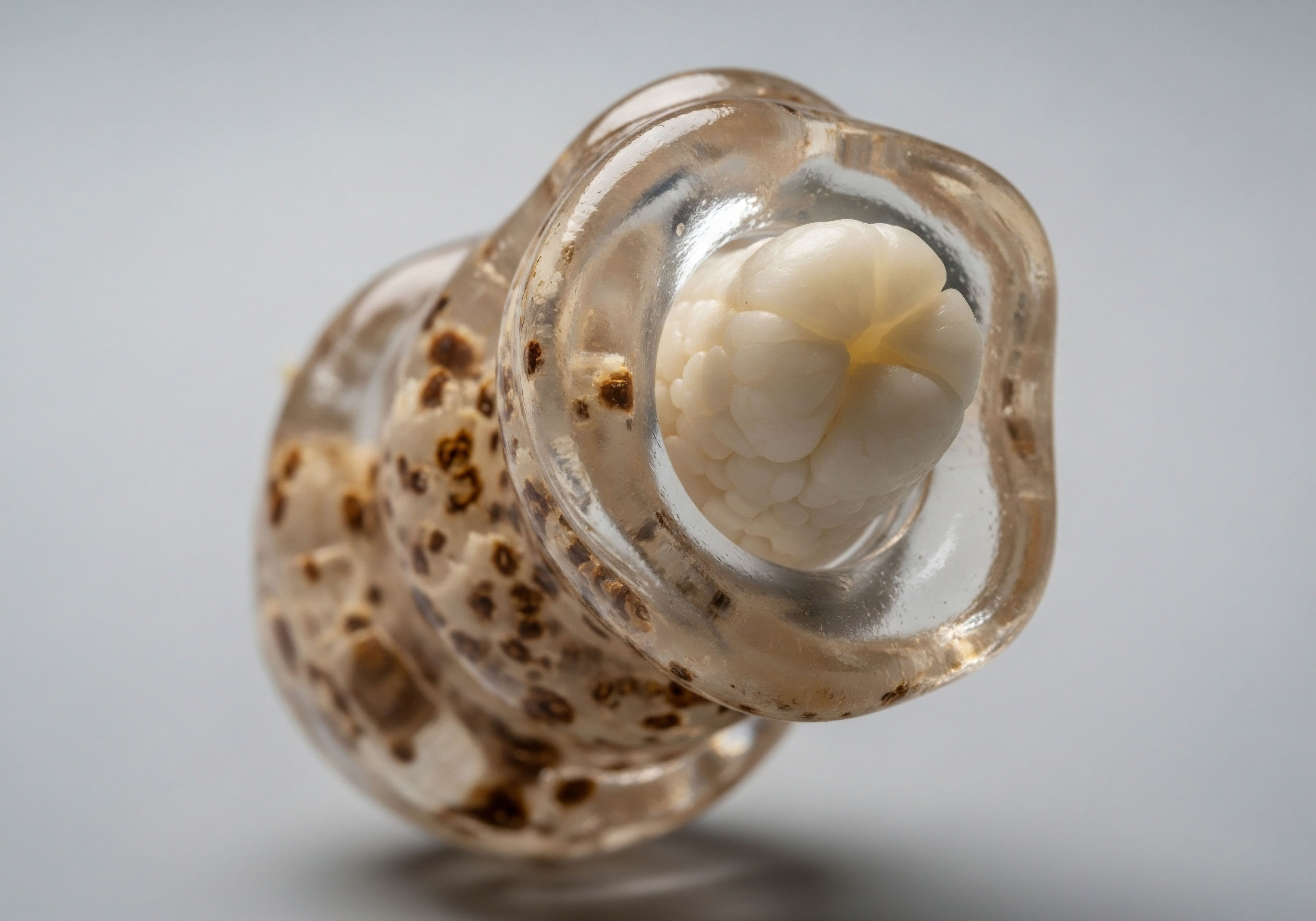

Fundamentals
The feeling of persistent fatigue, the kind that settles deep into your bones and seems disconnected from how much you sleep, is a familiar starting point for many. This physical state is often accompanied by a mental fog that makes clear thought difficult, or unexpected changes in your body composition that resist diet and exercise.
These experiences are valid, deeply personal, and they are frequently rooted in the intricate communication network of your endocrine system. Your body is speaking a language of symptoms, and learning to understand it is the first step toward reclaiming your vitality. The center of this conversation, for many, is the thyroid gland.
This small, butterfly-shaped gland at the base of your neck orchestrates your metabolic rate, influencing everything from body temperature and heart rate to the speed at which you burn calories.
The operational capacity of your thyroid is profoundly connected to another complex world within you ∞ the trillions of microorganisms residing in your gastrointestinal tract. This connection is known as the gut-thyroid axis, a bidirectional superhighway of information. The health and diversity of your gut microbiome directly influence how your thyroid functions, and conversely, your thyroid hormones affect the gut environment.
Understanding this relationship is foundational to understanding your own health. The process begins with the raw materials your thyroid needs to produce its hormones, many of which are absorbed through your gut. Essential minerals like iodine, selenium, and zinc must first be successfully extracted from your food, a task performed by a healthy intestinal lining and a balanced microbial community.
A healthy gut environment is a prerequisite for optimal thyroid hormone production and activation.
The journey of a thyroid hormone is a story of activation. Your thyroid primarily produces an inactive hormone called thyroxine, or T4. For your body to use it effectively, T4 must be converted into its active form, triiodothyronine, or T3. While some of this conversion happens in the liver, a significant portion, up to 20 percent, occurs within your gut.
This biological alchemy is mediated by specific bacterial enzymes. An imbalance in your gut flora, a condition known as dysbiosis, can impair this critical conversion process. The result is that even if your thyroid is producing enough T4, your body may not be getting enough of the active T3 it needs to power your cells. This can lead to symptoms of hypothyroidism despite seemingly normal lab results for TSH and T4, a scenario that can be incredibly frustrating.
The gut is also the primary residence of your immune system. Approximately 70-80% of your immune cells are located in the gut-associated lymphoid tissue (GALT). When the intestinal barrier becomes compromised, a state often called “leaky gut” or increased intestinal permeability, undigested food particles and bacterial components can pass into the bloodstream.
This breach triggers an immune response. In individuals with a genetic predisposition, this chronic immune activation can become misdirected, leading the body to attack its own tissues. In the case of Hashimoto’s thyroiditis, the most common cause of hypothyroidism in many parts of the world, the immune system mistakenly targets the thyroid gland.
Therefore, healing and sealing the gut lining is a primary objective in managing autoimmune thyroid conditions. Probiotic organisms contribute to this process by strengthening the intestinal barrier, modulating the immune response, and competing with pathogenic bacteria.


Intermediate
Moving from the foundational concept of the gut-thyroid axis, we can examine the specific mechanisms through which targeted probiotic strains exert their influence. The introduction of specific microorganisms is a strategic intervention designed to recalibrate the intestinal environment, which in turn supports endocrine function.
This is a clinical application of systems biology, acknowledging that the thyroid does not operate in isolation. Its performance is contingent upon the support it receives from other systems, particularly the digestive and immune systems housed within the gut.

Modulating Autoimmunity and Inflammation
Autoimmune thyroid diseases (AITDs), such as Hashimoto’s and Graves’ disease, are conditions of immune dysregulation. The gut microbiome is a key regulator of the immune system. An imbalance, or dysbiosis, can lead to a pro-inflammatory state and a loss of immune tolerance. Specific probiotic strains have demonstrated an ability to modulate immune pathways.
For instance, they can influence the balance between T-helper 17 (Th17) cells, which are often pro-inflammatory, and T-regulatory (Treg) cells, which help to suppress excessive immune responses. By promoting a shift towards a more regulated, anti-inflammatory state, probiotics can help dampen the autoimmune attack on the thyroid gland. This is a direct mechanism for reducing the root cause of tissue damage in Hashimoto’s.
- Lactobacillus rhamnosus ∞ This strain is well-documented for its ability to modulate the gut-immune axis. It reinforces the intestinal barrier, helping to prevent the leakage of inflammatory triggers into the bloodstream that can exacerbate autoimmune responses against the thyroid.
- Bifidobacterium longum ∞ Research suggests this strain can enhance immune modulation, which is beneficial in reducing the overactive immune activity seen in both Hashimoto’s and Graves’ disease. Clinical studies have shown that supplementing with B. longum alongside conventional treatment for Graves’ disease can help improve thyroid function and reduce levels of thyrotropin receptor antibodies (TRAb).
- Saccharomyces boulardii ∞ This beneficial yeast is effective at reducing gut inflammation and crowding out pathogenic organisms. By improving the overall health of the gut environment, it reduces the systemic inflammatory burden that can trigger or worsen autoimmune thyroid conditions.

Enhancing Nutrient Bioavailability and Hormone Conversion
The thyroid is exceptionally dependent on specific micronutrients for hormone synthesis and metabolism. Probiotics play a direct role in the absorption of these vital elements and in the activation of thyroid hormones themselves.
The strategic use of probiotics can improve the absorption of key thyroid minerals and support the conversion of inactive T4 to active T3.
The conversion of T4 to T3 is a critical step that is often overlooked. Your body’s cells cannot directly use T4; they require the active T3 form. The gut microbiome is a significant site for this conversion, and dysbiosis can severely hamper it.
Certain bacterial species produce enzymes, like intestinal sulfatases and β-glucuronidases, that are necessary for deconjugating and recycling thyroid hormones that have passed through the liver and into the gut via bile. A healthy microbiome essentially reactivates these hormones, making them available for the body to use again. An unhealthy microbiome fails at this task, leading to a net loss of active thyroid hormone.

How Do Probiotics Support Thyroid Nutrient Needs?
Many individuals with thyroid dysfunction are found to be deficient in key minerals. This is often a result of poor absorption related to gut health issues. Probiotics can help restore the gut’s ability to extract these nutrients from food.
| Probiotic Strain | Primary Mechanism of Action for Thyroid Support | Associated Nutrients & Hormones |
|---|---|---|
|
Lactobacillus reuteri |
Supports TSH receptor sensitivity and may reduce autoimmunity. Animal studies show it can increase serum T4 levels. |
Vitamin D, Thyroxine (T4) |
|
Bifidobacterium bifidum |
Enhances the absorption of minerals essential for thyroid hormone production and helps reduce thyroid inflammation. |
Iodine, Selenium, Zinc |
|
Lactobacillus plantarum |
Lowers gut inflammation and supports the T4 to T3 conversion process by maintaining a balanced gut microbiota. |
Triiodothyronine (T3) |
By addressing these core issues of immune dysregulation, nutrient malabsorption, and poor hormone conversion, a targeted probiotic protocol becomes a powerful adjunctive strategy in a comprehensive plan for thyroid wellness. It is a clinical approach that looks upstream to address the sources of dysfunction.


Academic
A sophisticated examination of probiotic influence on thyroid pathophysiology requires a deep analysis of the molecular and metabolic interplay within the gut-thyroid axis. The mechanisms extend beyond general immune support to involve specific enzymatic processes, metabolite production, and the intricate modulation of endocrine feedback loops. The conversation shifts from whether the gut affects the thyroid to precisely how microbial interventions can alter cellular signaling and hormone bioavailability, particularly in the context of autoimmune thyroid disease (AITD).

The Role of Microbial Metabolites Short-Chain Fatty Acids
The metabolic byproducts of bacterial fermentation, particularly short-chain fatty acids (SCFAs) like butyrate, propionate, and acetate, are potent signaling molecules with systemic effects. Butyrate, produced by commensal bacteria from the fermentation of dietary fiber, serves as the primary energy source for colonocytes, the cells lining the colon.
This function is critical for maintaining the integrity of the intestinal barrier. A compromised barrier allows for the translocation of bacterial components like lipopolysaccharide (LPS), an endotoxin from the cell walls of Gram-negative bacteria. When LPS enters circulation, it triggers a powerful inflammatory cascade via Toll-like receptor 4 (TLR4) activation, a pathway implicated in the exacerbation of AITDs.
SCFAs also have profound immunomodulatory effects. They promote the differentiation of T-regulatory (Treg) cells, which are essential for maintaining self-tolerance and suppressing autoimmunity. An environment rich in butyrate can help restore the balance between pro-inflammatory Th17 cells and anti-inflammatory Treg cells, a critical equilibrium that is often disturbed in patients with Hashimoto’s thyroiditis and Graves’ disease.
Therefore, probiotic strains known to enhance the populations of SCFA-producing bacteria, such as those from the Bifidobacterium and Lactobacillus genera, offer a targeted therapeutic strategy to address both intestinal permeability and the underlying immune dysregulation of AITD.

Microbial Influence on Iodothyronine Metabolism and Bioavailability
The gut is a significant site for the metabolism of thyroid hormones through the enterohepatic circulation. Thyroid hormones conjugated in the liver are excreted into the intestine via bile. Specific bacterial enzymes, such as β-glucuronidases, can deconjugate these hormones, allowing them to be reabsorbed into circulation.
The composition of the gut microbiota determines the efficiency of this salvage pathway. A dysbiotic microbiome may lack sufficient enzymatic activity, leading to increased fecal excretion of thyroid hormones and contributing to a state of functional hypothyroidism.
The enzymatic activity of the gut microbiome directly impacts the circulating pool of active thyroid hormone.
Furthermore, the gut microbiota influences the availability of micronutrients that are indispensable for thyroid function. Selenium is a critical component of the deiodinase enzymes that convert T4 to T3. The bioavailability of selenium can be influenced by the gut environment. Probiotic supplementation, particularly with strains like Saccharomyces boulardii, has been shown to improve selenium absorption. This microbial assistance ensures that the necessary cofactors are available for the peripheral activation of thyroid hormone, a process vital for metabolic health.

Can Probiotic Interventions Alter Clinical Thyroid Endpoints?
The translation of these mechanistic insights into measurable clinical outcomes is an area of active research. While some studies have yielded promising results, the evidence remains complex. A 2024 meta-analysis published in PLOS One, which reviewed eight randomized controlled trials, found that probiotic or prebiotic supplementation did not produce statistically significant changes in TSH, fT4, or fT3 levels across the board.
The same analysis, however, did find a significant reduction in thyrotropin receptor antibody (TRAb) levels in patients with Graves’ disease. This suggests that while probiotics may not directly alter hormone levels in all hypothyroid patients, their primary impact could be immunomodulatory, which is particularly relevant for the autoimmune sub-population.
Another study investigating the probiotic formulation VSL#3 in hypothyroid patients on levothyroxine treatment found that while direct hormone parameters were unchanged, the group receiving probiotics required fewer adjustments to their medication dosage compared to the placebo group.
This points toward a stabilizing effect on thyroid hormone homeostasis, possibly by improving the consistency of levothyroxine absorption or by buffering the fluctuations caused by variations in gut motility and metabolism. These findings underscore the complexity of the gut-thyroid relationship. The benefits of probiotic therapy appear to be mediated through indirect pathways, including immune regulation, barrier function enhancement, and metabolic stabilization.
| Study Focus | Key Probiotic Genera/Strains Investigated | Reported Outcome | Clinical Implication |
|---|---|---|---|
|
Graves’ Disease Adjunct Therapy |
Bifidobacterium longum |
Improved thyroid function indices and significantly reduced TRAb levels when combined with methimazole. |
Potential for immunomodulatory support in autoimmune hyperthyroidism, helping to reduce the autoimmune attack. |
|
Hypothyroidism & Levothyroxine |
VSL#3 (Multi-strain Lactobacillus, Bifidobacterium) |
No direct change in TSH, fT3, or fT4, but fewer levothyroxine dose adjustments were needed. |
Suggests a role in stabilizing hormone levels and potentially improving the absorption or bioavailability of medication. |
|
General Hypothyroidism |
Synbiotic (Lactobacillus, Bifidobacterium, FOS) |
Significantly reduced TSH and improved fT3/TSH ratio in one study, allowing for a lower T4 medication dose. |
Indicates a potential to improve overall thyroid efficiency and reduce medication dependency in some patients. |
|
Meta-Analysis of AITD |
Various Probiotics/Prebiotics |
No significant overall change in TSH/fT4/fT3, but a modest reduction in TRAb levels was observed. |
Reinforces the idea that the primary effect of probiotics in AITD is likely on the immune system rather than direct hormone synthesis. |

References
- Shu, Qing, et al. “Effect of probiotics or prebiotics on thyroid function ∞ A meta-analysis of eight randomized controlled trials.” PLoS One, vol. 19, no. 1, 2024, e0295329.
- Knezevic, J. Starchl, C. Tmava Berisha, A. & Amrein, K. “Thyroid-Gut-Axis ∞ How Does the Microbiota Influence Thyroid Function?” Nutrients, vol. 12, no. 6, 2020, p. 1769.
- Fröhlich, E. & Wahl, R. “Microbiota and Thyroid Interaction in Health and Disease.” Trends in Endocrinology & Metabolism, vol. 30, no. 8, 2019, pp. 479-490.
- Virili, C. & Centanni, M. “Does microbiota composition affect thyroid homeostasis?” Endocrine, vol. 49, no. 3, 2015, pp. 583-587.
- Gong, B. et al. “Association Between Gut Microbiota and Autoimmune Thyroid Disease ∞ A Systematic Review and Meta-Analysis.” Frontiers in Endocrinology, vol. 12, 2021, p. 774362.
- Huo, D. et al. “Probiotic Bifidobacterium longum supplied with methimazole improved the thyroid function of Graves’ disease patients through the gut-thyroid axis.” Communications Biology, vol. 4, no. 1, 2021, p. 1046.
- Talebi, S. et al. “The effects of synbiotic supplementation on thyroid function and inflammation in hypothyroid patients ∞ A randomized, double-blind, placebo-controlled trial.” Complementary Therapies in Medicine, vol. 48, 2020, p. 102234.
- Spaggiari, G. et al. “Probiotics Ingestion Does Not Directly Affect Thyroid Hormonal Parameters in Hypothyroid Patients on Levothyroxine Treatment.” Frontiers in Endocrinology, vol. 8, 2017, p. 316.
- Varian, B. J. et al. “Beneficial bacteria stimulate youthful thyroid gland activity.” Journal of Obesity & Weight Loss Therapy, vol. 4, no. 2, 2014.
- Ishaq, H. M. et al. “Gut microbiota and its association with autoimmune thyroid diseases.” Journal of the College of Physicians and Surgeons Pakistan, vol. 27, no. 12, 2017, pp. 776-780.

Reflection
The information presented here provides a map of the biological connections between your internal microbial world and your endocrine health. It details the pathways, identifies the key participants, and outlines the current scientific understanding of how one system influences the other. This knowledge is a tool.
It shifts the perspective from being a passive recipient of symptoms to becoming an active participant in your own biological story. The path forward involves observing how your body responds to changes in nutrition and lifestyle. It means paying attention to the subtle signals of your own physiology.
This journey of recalibration is deeply personal, and the data points that matter most are your own. The ultimate goal is to use this clinical understanding to build a protocol that is uniquely yours, one that restores function and allows you to operate with renewed vitality.



